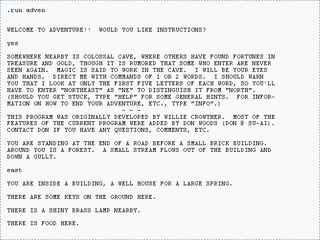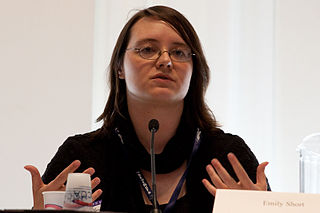Related Research Articles

Interactive fiction, often abbreviated IF, is software simulating environments in which players use text commands to control characters and influence the environment. Works in this form can be understood as literary narratives, either in the form of interactive narratives or interactive narrations. These works can also be understood as a form of video game, either in the form of an adventure game or role-playing game. In common usage, the term refers to text adventures, a type of adventure game where the entire interface can be "text-only", however, graphic text adventures still fall under the text adventure category if the main way to interact with the game is by typing text. Some users of the term distinguish between interactive fiction, known as "Puzzle-free", that focuses on narrative, and "text adventures" that focus on puzzles.
The Interactive Fiction Competition is one of several annual competitions for works of interactive fiction. It has been held since 1995. It is intended for fairly short games, as judges are only allowed to spend two hours playing a game before deciding how many points to award it. The competition has been described as the "Super Bowl" of interactive fiction.
Inform is a programming language and design system for interactive fiction originally created in 1993 by Graham Nelson. Inform can generate programs designed for the Z-code or Glulx virtual machines. Versions 1 through 5 were released between 1993 and 1996. Around 1996, Nelson rewrote Inform from first principles to create version 6. Over the following decade, version 6 became reasonably stable and a popular language for writing interactive fiction. In 2006, Nelson released Inform 7, a completely new language based on principles of natural language and a new set of tools based around a book-publishing metaphor.
Text Adventure Development System (TADS) is a prototype-based domain-specific programming language and set of standard libraries for creating interactive fiction (IF) games.

Photopia is a piece of literature by Adam Cadre rendered in the form of interactive fiction, and written in Inform. It has received both praise and criticism for its heavy focus on fiction rather than on interactivity. It won first place in the 1998 Interactive Fiction Competition. Photopia has few puzzles and a linear structure, allowing the player no way to alter the eventual conclusion but maintaining the illusion of non-linearity.

Andrew Plotkin, also known as Zarf, is a central figure in the modern interactive fiction (IF) community. Having both written a number of award-winning games and developed a range of new file formats, interpreters, and other utilities for the design, production, and running of IF games, Plotkin is widely recognised for both his creative and his technical contributions to the homebrew IF scene.
The XYZZY Awards are the annual awards given to works of interactive fiction, serving a similar role to the Academy Awards for film. The awards were inaugurated in 1997 by Eileen Mullin, the editor of XYZZYnews. Any game released during the year prior to the award ceremony is eligible for nomination to receive an award. The decision process takes place in two stages: members of the interactive fiction community nominate works within specific categories and sufficiently supported nominations become finalists within those categories. Community members then vote among the finalists, and the game receiving a plurality of votes is given the award in an online ceremony.
Spider and Web is a piece of interactive fiction written by Andrew Plotkin.

Slouching Towards Bedlam is an interactive fiction game that won the first place in the 2003 Interactive Fiction Competition. It is a collaboration between American authors Daniel Ravipinto and Star Foster. Slouching Towards Bedlam was finalist for eight 2003 XYZZY Awards, winning four: Best Game, Setting, Story, and Individual NPC. The game takes place in a steampunk Victorian era setting. Its title is inspired by a line from The Second Coming, a poem by W. B. Yeats.
The Dreamhold is an interactive fiction game by Andrew Plotkin released in 2004. Its primary purpose is to be a tutorial to interactive fiction, and because of that the "core" of the game is relatively easy to finish.

Emily Short is an interactive fiction (IF) writer.
The Space Under the Window is a 1997 interactive fiction game by Andrew Plotkin. The game is part of a collaborative art piece, also entitled "The Space Under the Window", by Kristin Looney – each piece had to have this title, but was otherwise unconstrained.
Jon Ingold is a British author of interactive fiction and co-founder of inkle, where he co-directed and co-wrote 80 Days, and wrote Heaven's Vault and Overboard!. His interactive fiction has frequently been nominated for XYZZY Awards and has won on multiple occasions, including Best Game, Best Story and Best Setting awards for All Roads in 2001. Ingold's works are notable for their attention to the levels of knowledge that the player and player character have of the in-game situation, with the effect often depending on a player who understands more than the character or vice versa. Ingold has also written a number of plays, short stories and novels.
Hunter, in Darkness is a 1999 interactive fiction game by Andrew Plotkin, written in Inform. It won the "Best Individual Puzzle" and "Best Setting" categories in the 1999 XYZZY Awards, and came in eighth overall in the 1999 Interactive Fiction Competition.

Anchorhead is a Lovecraftian horror interactive fiction game, originally written and published by Michael S. Gentry in 1998. The game is heavily inspired by the works and writing style of H.P. Lovecraft, particularly the Cthulhu mythos.
Vespers is an interactive fiction game written in 2005 by Jason Devlin that placed first at the 2005 Interactive Fiction Competition. It also won the XYZZY Awards for Best Game, Best NPCs, Best Setting, and Best Writing.
Shade is a psychological horror interactive fiction game written and published by Andrew Plotkin in 2000.

Floatpoint is a 2006 work of interactive fiction written by Emily Short about a diplomat sent to an endangered colony to discuss evacuation options and terms of cohabitation. It is written in Inform 7 and won the 2006 annual Interactive Fiction Competition. Floatpoint also won 2006 XYZZY Awards for Best Settings and Best NPCs. The game was generally praised for its use of multiple endings.

Rat Chaos is a 2012 stream of consciousness art and browser game created by Winter Lake.
The Interactive Fiction Technology Foundation (IFTF) is a nonprofit charitable organization founded in June 2016 working to maintain, improve, and preserve tools and services used in the creation and distribution of interactive fiction.
References
- ↑ O'Brian, Paul. "Earth and Sky" . Retrieved 30 March 2013.
- ↑ Short, Emily. "Earth and Sky Review". SPAG Magazine. Retrieved 3 April 2013.
- ↑ Plotkin, Andrew. "Earth and Sky Review" . Retrieved 4 April 2013.
- ↑ "7th Annual Interactive Fiction Competition Detailed Voting Results" . Retrieved 30 March 2013.
- ↑ Myrow, Adam. "Another Earth, Another Sky". SPAG Magazine. Retrieved 30 March 2013.
- ↑ Plotkin, Andrew. "Earth and Sky 2: Another Earth, Another Sky" . Retrieved 4 April 2013.
- ↑ "The 8th Annual Interactive Fiction Competition" . Retrieved 30 March 2013.
- ↑ "2002 XYZZY Awards - Details" . Retrieved 30 March 2013.
- ↑ Seegert, Alf (2009). "'Doing There' Vs 'Being There' Performing Presence in Interactive Fiction". Journal of Gaming and Virtual Worlds. 1: 34–35. doi:10.1386/jgvw.1.1.23/1 . Retrieved 3 April 2013.
- ↑ Myrow, Adam. "Earth and Sky". SPAG Magazine. Retrieved 30 March 2013.
- ↑ "2004 XYZZY Awards - Details" . Retrieved 30 March 2013.